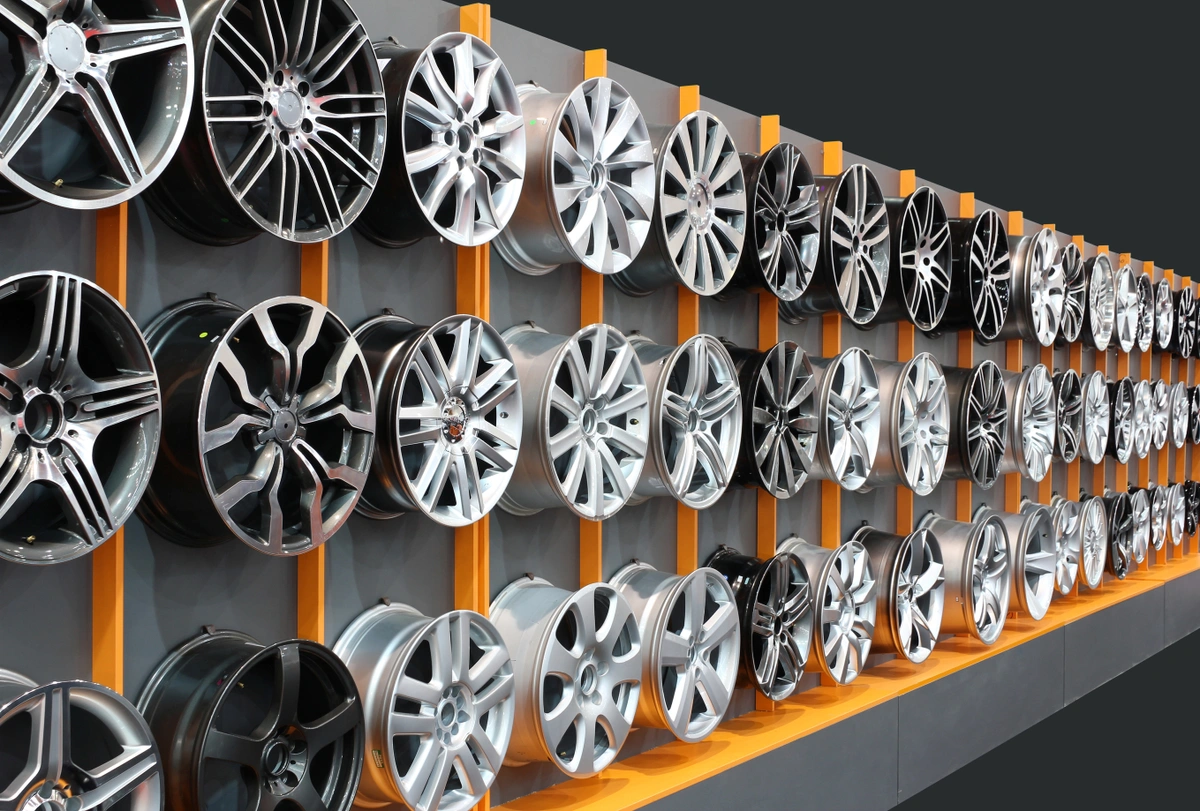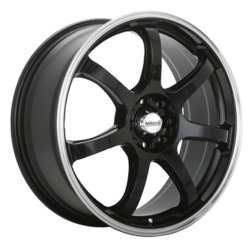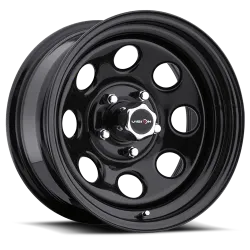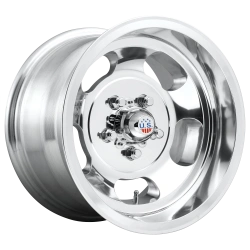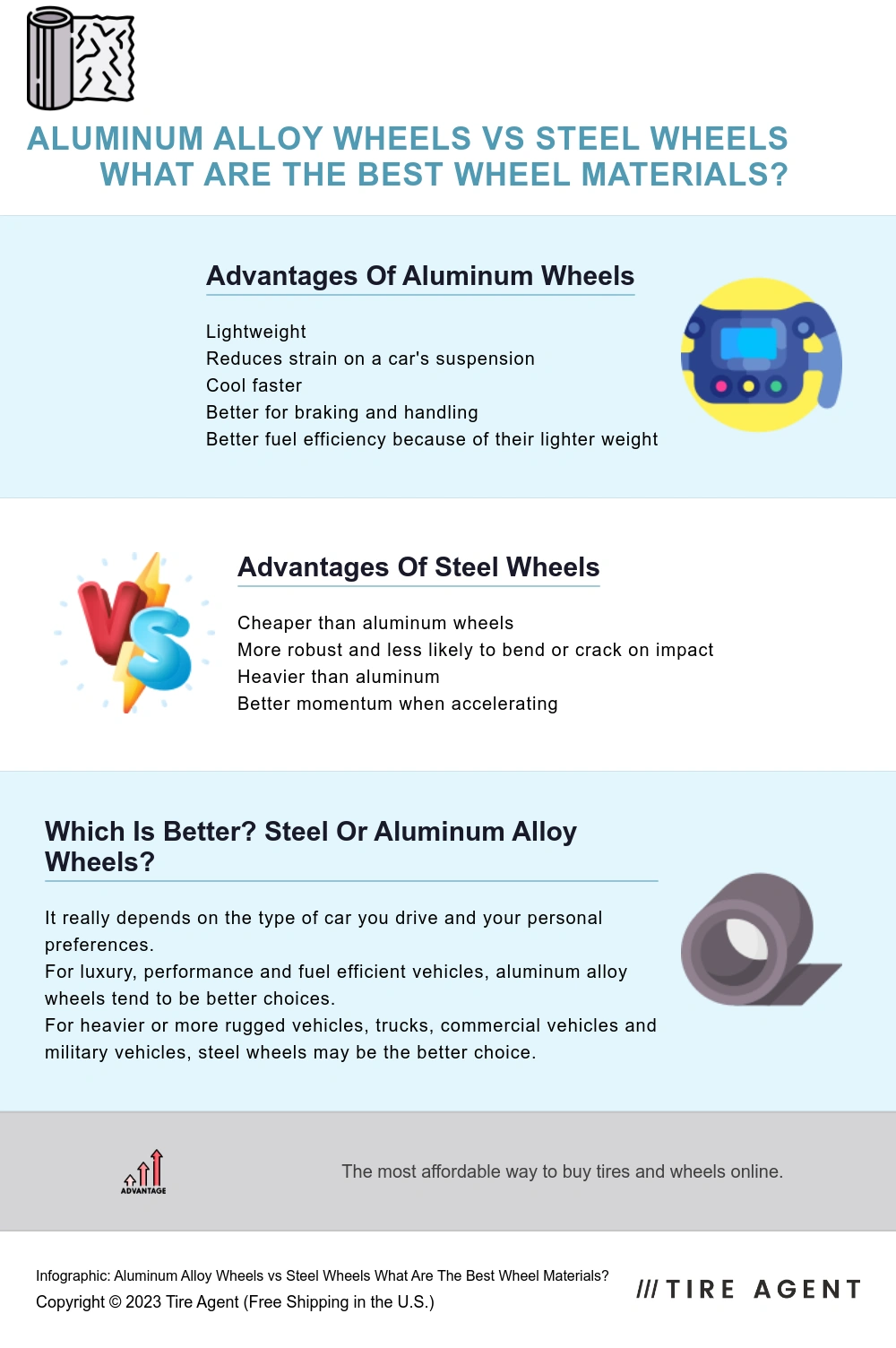Your Shopping Cart
Your cart is empty.
Subtotal ( items)
Instant Rebate Applied:
Promo Code Applied: ID.me Discount Applied:
Have a Promo Code?
Size:
Item
Item
Selected for:
/ each
Add-Ons
Wireless air pump capable of pumping up to 150 psi with 2000 MAH power bank.



Fully protect your clothes and vehicle interior during transportation of your tires. For Tires up to 31" tall and wheels up to 22".
Per sensor
Add TPMS Sensors
/per sensor
Please confirm the make, year, model and trim of the vehicle you want to purchase for:
How many sensors do you need?
The vehicle you have selected is not compatible with aftermarket TPMS Sensors.
Enter a different vehicle to add TPMS sensors

 Front Tire Size:
Front Tire Size:
 Rear Tire Size:
Rear Tire Size:
 Your Vehicle:
Your Vehicle:
Pros & Cons of Staggered Fitment

Attractive Design

Improved Handling

Improved Cornering
Bumpier Ride
Poor Traction in Snow
How do I find my tire size?



Need help?
 Your Vehicle:
Your Vehicle:
Pros & Cons of Staggered Fitment

Attractive Design

Improved Handling

Improved Cornering
Bumpier Ride
Poor Traction in Snow
How do I find my tire size?



Need help?
Pros & Cons of Staggered Fitment

Attractive Design

Improved Handling

Improved Cornering
Bumpier Ride
Poor Traction in Snow
Need help?
Need help?
How do I know if I have an LT tire?

 Your Vehicle:
Your Vehicle:
Sorry, we could not find any available
wheels for your sizing selections.
Need help?
What Are the Different Types of Wheels? Alloy, Steel, Chrome & Mags
By Tire Agent Staff
August 04, 2023
Guide to 4 Types of Rims: Steel, Aluminum Alloy, Chrome, and Magnesium
(Original post date: March 14, 2022)
There are many different types and styles of wheels, all of which fall into two basic types: aluminum alloy wheels and steel wheels. In this guide, we explain the differences between alloy vs steel wheels, as well as what chrome wheels and mag wheels are.
Most modern wheels are created using either aluminum or steel. Steel wheels are typically heavier than aluminum wheels and are welded together from two pieces. Aluminum, or alloy wheels, are often one-piece but can be multi-piece.
Here's a closer look at the different kinds of wheels.
Alloy wheels/rims
The word "alloy" refers to a metal that's made by combining two or more metallic elements. For example, when you combine tin and copper you get an alloy called bronze. Aluminum alloy means that the predominant metal is aluminum, which has been combined with other metallic elements. Why? Aluminum alloy wheels are comprised of several metals, but aluminum and magnesium are the most common, making them lighter than steel versions. You might hear them referred to as "mag" wheels, short for magnesium.
Alloy wheels definition: A vehicle wheel that is made from a combination of metallic elements, usually aluminum or magnesium and some other metals. Interestingly, the word "alloy" refers to any combination of metallic elements. So, technically, steel wheels are alloys because steel is a combination of iron and carbon; however, the industry reserves the term "alloy" to refer to aluminum.
Alloy wheels feature unique-looking designs and finishes that can be used to personalize your vehicle. Options include chrome or a painted, machined, or polished finish.
Here are the pros and cons of alloy wheels.
- Alloy wheels advantages: More appealing and lighter weight than steel wheels. Better fuel efficiency, braking, and tire life.
- Disadvantages of alloy wheels: More likely to sustain curb rash and other potential damage. More expensive to buy and repair than steel wheels.
Sometimes we get inquiries asking about the difference between alloy wheels vs normal wheels. "Normal wheels" is sometimes used to describe steel wheels because, at one time, steel wheels were the norm. However, today in 2023, aluminum alloys are the norm. The majority of passenger vehicles use OEM aluminum alloy rims.
Steel wheels/rims
Steel rims were once the standard for automobiles. Wheels made of steel are a cost-effective option that can be more durable than alloy rims. Steel wheels' durability is determined by how much weight they can support.
Steel wheels definition: A vehicle tire rim that is made from an alloy of carbon and iron. They are typically more durable and heavier than aluminum alloys; however, they tend to not look as nice as aluminum alloys.
Steel wheels are also less prone to damage and perform effectively in all types of weather. If you have a heavy-duty vehicle, steel rims are the best option.
- Advantages of steel wheels: Steel wheels cost less than alloy wheels, and they are heavier, which can be good for winter driving. Steel wheels offer the strength and durability that trucks and heavy equipment demand.
- Disadvantages of steel wheels: They are heavier than alloy wheels and, therefore, could be less fuel-efficient. Most experts recommend steel wheels for heavier vehicles.
Chrome wheels/rims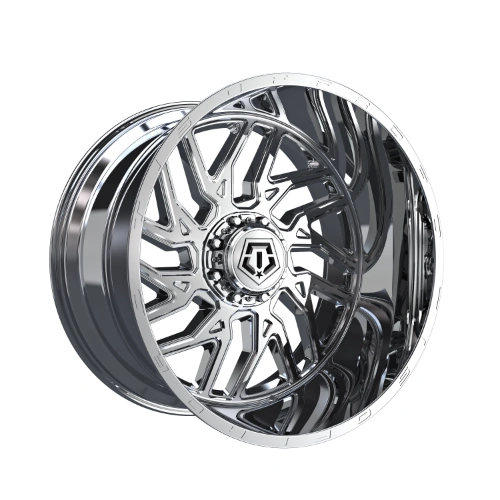
Chrome wheels are alloy wheels that have been coated in a multi-layer chrome finish. They are perfect for drivers who are looking for something a tad snazzier and will make your vehicle stand out from the crowd. "Chrome" refers to the coating or finish of the wheels, not to the wheel materials themselves.
- Advantages of chrome wheels: If you like the shiny polished metal look, chrome wheels have that shiny finish. They're eye grabbers, which is why chrome wheels and rims are commonly used for sport and show cars.
- Disadvantages of chrome wheels: Unfortunately, chrome is easily damaged, similar to alloy wheels. They're also more challenging to care for. Because chrome plating involves adding layers of metal on top of the wheel, chrome finishes add weight to your wheels.
Magnesium wheels/rims
"Mags" are vehicle rims that use magnesium as the predominant metallic element. They are made by casting or forging, and they tend to be the lightest weight, making them more popular among racing motorsports. Magnesium is more prone to corrosion, which is one reason it is not a top choice for wheel materials. Although there have been rumors that magesium wheels are fire hazards. Pure magnesium is highly flammable, but magnesium alloys are not (MagnesiumWheels.com); magnesium wheels are not illegal. In fact, they're used in some aviation applications and F1 racing. Although it is the lightest wheel material, mag alloys are not as common because of their susceptibility to corrosion.
What type of rims do I have?
How do you know what type of rims you have? A household magnet will tell you. Magnets stick to steel, but they don't stick to aluminum.
Bottom Line: Alloy vs Steel, What Is the Best Material for Wheels?
Alloy wheels or steel wheels: Which is better? The answer depends on your vehicle, your budget, your driving habits, and your fuel economy.
The simplest answer is: If your vehicle came with alloy wheels, stick with alloy, and vice versa if they came with steel wheels.
You'll spend more on alloy wheels, but they are better for fuel-efficiency. They're lightweight, offer better handling, and look better.
For heavy-duty vehicles, steel wheels tend to be better. They are also better for winter conditions. If you want a sharp-looking wheel, go alloy.
Next Post:
What Are Bias Ply Tires Used For?How to Qualify for the $50 Offer
- Add items to your cart and begin checkout.
- Select PayPair and apply for financing.
- If you’re approved by a participating lender, you’ll see a $50 promotional rebate applied to your order total.
-
To receive the $50, you must:
- Complete your purchase with a qualifying lender,
- Agree to the payment terms,
- And make the required number of consecutive on-time payments, as specified by the lender.
Note: Offer available only through select lenders. Additional eligibility requirements and conditions apply. Rebate may be issued after verification of qualifying payment activity. Terms subject to change.
How to Purchase Tires and Wheels
With a Payment Plan
Tire Agent's payment plans make it easy to get the best partial or full set of tires and wheels for your vehicle.
It's fast, secure and won't affect your credit score
Match with multiple lenders
Why Choose PayPair?
PayPair’s Partners and Plans

No Money Down

No Money Down

No Credit Needed*

No Money Down

$1 to Start!*

No Money Down

No Credit Needed*

$1 to Start!*

No Money Down
Other Payment Plans

Pay Over Time

Pay with your bank account

Simplified checkout experience

Faster and easier than using cards or cash

Simplified checkout experience

Faster and easier than using cards or cash
*SNAP: The advertised service is a lease-to-own agreement provided by Snap RTO LLC. Lease-to-own financing is not available to residents of Minnesota, New Jersey and Wisconsin. NO CREDIT NEEDED: Not all applicants are approved. While no credit history is required, Snap obtains information from consumer reporting agencies in connection with applications, and your score with those agencies may be affected. PAYMENT PLAN: The standard plan consists of renewable lease terms. To exercise an early ownership, consumers must make regular payments on time and schedule additional payments via the customer portal or by contacting Customer Care at 1-877-557-3769. KATAPULT: The Promotional Initial Payment (plus any applicable taxes and fees) is due at lease signing. Your lease-purchase payment amount will be determined after you select your product(s). You will not acquire ownership of the product(s) if the total amount necessary to acquire ownership is not paid. The Promotional Initial Payment does not reduce the cost of the lease-purchase agreement. The Promotional Initial Payment is only available when shopping at Tire Agent through the Katapult mobile app and at Tire Agent's’s website. Product pricing subject to change and availability. Disclosure: 90-day early purchase option (EPO) terms and conditions apply: 90-Day (3 months in CA) You can buy out your lease-to-own agreement within the first 90-days. This amount includes the cash price, plus the lease-to-own cost for the first 90-days. Taking advantage of the 90-day purchase option will save you the most money! PROGRESSIVE: Ownership by rental/lease agreement with Progressive Leasing costs more than the retailer’s cash price. Select items only. Cancel or purchase early at any time. Not available in MN, NJ, VT, WI, WY. Progressive Leasing obtains information from credit bureaus. Not all applicants are approved. Standard agreement offers 12 months to ownership. 90-day purchase options cost more than the retailer’s cash price (except 3-month option in CA). To purchase early or to cancel lease, you must call 877-898-1970. Retailer cannot activate early purchase options.

